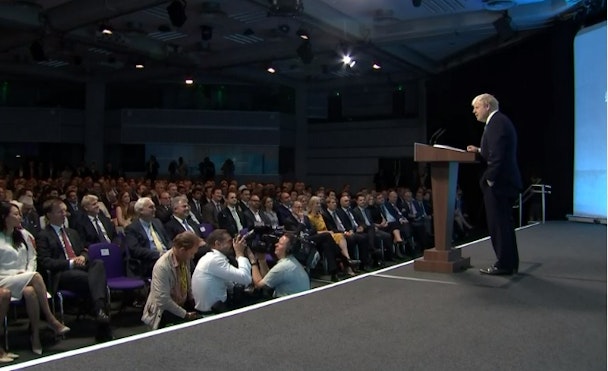Boris Johnson: an unconventional but victorious communication strategy
How to explain the triumph of Boris Johnson in the latest Conservative leadership contest? A triumph apparently as inexorable -albeit with the odd bump along the way- as his exit from the last one was unexpected and humiliating.

Boris Johnson: an unconventional but victorious communication strategy
On the surface of it, nobody could describe his comms strategy as conventional. Indeed, many questioned throughout the campaign if he had a strategy at all other than avoiding debate. Many wheeled out the ‘frontrunners never win the Tory leadership line’. And many predicted that it was simply impossible for him to get through weeks of scrutiny without making some enormous and campaign-ending faux pas.
And yet, today he has won. Why?
I would identify four key reasons.
The first and surely the most important reason is the embrace of authenticity. You might not like Boris. But you know him -indeed, we all know him so well that we all use his second Christian name, and that name alone- to describe him. He’s shambolic in dress; chaotic in private life; eccentric in language. And yet he does at least appear to be authentic. In an era when the public says it wants authenticity as opposed to off-the-shelf politicians pre-packaged and artificial, well he ticks boxes. Now one might well say -hang on a moment. This authenticity is fake. A razor-sharp ambition is hidden by ill-cut expensive suits and ill-combed expensive haircuts. But if his authenticity is indeed inauthentic, then it is inauthenticity that has been maintained with remarkable consistency.
The second is the power of comparison. In comparison with his rivals, and with the person he replaces tomorrow, he appears *different*. And quite exciting. And to a party that is utterly exasperated with its present stupor, that is a powerful communication tool in itself. The Tory Party is quite simply bored. Bored of Brexit rows. Bored of still being in the EU. Bored of talking about backstops. Bored of indecisive Parliamentary votes. Bored of not talking about the other things that excite it. And yes, they know he’s. risky. They know that red wine sofa gate has been followed by 'kipper gate'. And that there might be many more gates ahead. But a majority of them are happy to take that risk. They prefer it to fields of wheat levels of naughtiness. And actually, the fact that he makes epic errors of fact and just brushes them off appeals to them at a certain level.
The third is the pull of optimism. Reagan deployed it in spades. And Boris is nothing if not optimistic. Now again one might question whether that optimism is built on solid foundations. Invoking the landing on the moon as an example of how we must think big and think optimistically can be criticised as comparing years of planning and scientific calculation with a few warms sentences and upbeat soundbites. But to invoke another US President ’Yes we can’ sounds so much better than ‘I think there’s a decent chance we might be able to’.
And the final of the four is, of course, the understanding of when to pick your fights. Frontrunners don’t debate their opponents unless they absolutely have to. They have nothing to gain and everything to lose. Did Blair debate Major? No. Hague? No. Howard? No. So while ducking out of virtually every debate allowed him to be painted as cowardly and fearful of scrutiny, it minimised risk. Even in Boris’s case, safety first has a time and a place.
None of this piece has so far touched on the campaign of his opponent, Jeremy Hunt. And that’s deliberate. Because this fight was never the Foreign Secretary’s to win. No matter how brilliant his campaign or his messages might have been, he was relying on errors from, or revelations about, his opponent.
Many will draw comparisons with Trump. The disdain for fact-based campaigning. The florid language. The apparent utter self-belief. The crazy hair.
But I would suggest that we look at them both not through the prism of our own political views, but try instead to deploy professional communications skills to analyse why it is that they succeeded in their goals when so many said that they could not possibly do so.
They deliver their messages direct. Trump through his Twitter account. Boris through his Telegraph column.
They at least appear to believe completely in what they say.
They don’t couch their messages in political-speak. Indeed they don’t look like politicians at all for most of the time.
And in an era when the ‘Establishment’ is neither trusted, nor revered, nor liked, they play to a sense of grievance, ennui, and frustration.despite clearly being part of the establishment themselves.
Which can all be summed up like this: they’ve tailored a message for their times. And they’ve delivered it astonishingly well to their target audiences.
Now one final comment. I hesitated before writing this piece. Because I know that some will respond by saying ‘he’s defending Boris! This is outrageous’. And let me be clear: this is a personal piece of analysis, not a PRCA one. And it’s defending nobody. But is intended to be an *analysis*.
The error made of those appalled by the Brexit vote; the Trump vote; the Boris vote is that they throw their hands up in the air and scream ‘how could they? Don’t they realised what they’ve done?’. And so they are destined to be on the losing side of the arguments again. It is time in this hectic political era for us all to embrace analysis a little more. And emotion a little yes.
Francis Ingham is director general of the PRCA. This article is written in a personal capacity.
